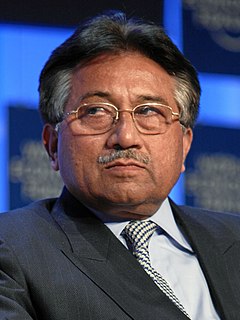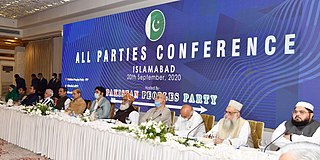Related Research Articles

Formally, Freedom of religion in Pakistan is guaranteed by the Constitution of Pakistan for individuals of various religions and religious sects.

The Supreme Court of Pakistan is the apex court in the judicial hierarchy of the Islamic Republic of Pakistan.

Asif Ali Zardari is a Pakistani politician who is the president of Pakistan Peoples Party Parliamentarians and was the co-chairperson of Pakistan People's Party. He served as the 11th president of Pakistan from 2008 to 2013, the first president born after Partition. He is the widower of two times elected former Prime Minister of Pakistan, Benazir Bhutto. He has been a member of the National Assembly of Pakistan since August 2018.

Asma Jilani Jahangir was a Pakistani human rights lawyer and social activist who co-founded and chaired the Human Rights Commission of Pakistan. Jahangir was known for playing a prominent role in the Lawyers' Movement and served as the United Nations Special Rapporteur on Freedom of Religion or Belief and as a trustee at the International Crisis Group.
Sharization or Islamization has a long history in Pakistan since the 1950s, but it became the primary policy, or "centerpiece" of the government of General Muhammad Zia-ul-Haq, the ruler of Pakistan from 1977 until his death in 1988. Zia has also been called "the person most responsible for turning Pakistan into a global center for political Islam."

Iftikhar Muhammad Chaudhry is a Pakistani jurist who served as the 20th Chief Justice of Pakistan over three non-consecutive terms from 29 June 2005 to 11 December 2013.

The 1999 military takeover in Pakistan was a bloodless coup d'état initiated by the military staff at the Joint Staff HQ working under Chairman of the Joint Chiefs of Staff Committee General Pervez Musharraf. The instigators seized control of the civilian government of the publicly elected Prime Minister Nawaz Sharif on 12 October 1999. On 14 October, General Musharraf, acting as the country's Chief Executive, issued a controversial provisional order that suspended the Constitution of Pakistan.

The situation of Human Rights in Pakistan is complex as a result of the country's diversity, large population, its status as a developing country and a sovereign Islamic democracy with a mixture of both Islamic and secular law. The Constitution of Pakistan provides for fundamental rights. The Clauses also provide for an independent Supreme Court, separation of executive and judiciary, an independent judiciary, independent Human Rights commission and freedom of movement within the country and abroad. However these clauses are not respected in practice.

The People's Power Party is a defunct Thai political party. The party leader was Somchai Wongsawat, the Party Secretary General was Surapong Suebwonglee, and the Party Spokesperson was Kuthep Saikrajarng. Most MPs of the party originally hailed from the Thai Rak Thai Party and thus the party was its de facto reincarnation with former prime minister Thaksin Shinawatra as its "leader." The PPP had a populist platform and was strong in the North, Central, and Northeastern regions of Thailand. The party became the leader of the coalition government after the junta-government supported 2007 general election. PAD, the leading anti-Thaksin movement, vowed to oppose it after the party decided to launch the amendment of the 2007 Constitution.
Syed Mohammad Iqbal Kazmi is a human rights activist and journalist and is based out of city of Karachi. He is known to have registered cases against Karachi Electricity Supply Company, Pakistan Electronic Media Regulatory Authority Government of Sindh and IDPs, Mobille Courts, Special courts, Sindh High Court moved for judicial inquiry into Ashura blast, and Targate killing in Karachi. Kazmi moved in the Supreme Court of Pakistan against the beneficiaries of the National Reconciliation Ordinance (NRO) challenging the eligibility of the beneficiaries.

A state of emergency was declared by President of Pakistan Pervez Musharraf on 3 November 2007 which lasted until 15 December 2007, during which the constitution of Pakistan was suspended. When the state of emergency was declared, Musharraf controversially held both positions of President and Chief of Army Staff. He later resigned as army chief 25 days into the emergency on 28 November. The state of emergency and its responses are generally attributed to the controversies surrounding the re-election of Musharraf during the presidential election on 6 October 2007, including his holding of both offices of President and Chief of Army Staff at the time.
Mass media in Pakistan provides information on television, radio, cinema, newspapers, and magazines in Pakistan. Pakistan has a vibrant media landscape; among the most dynamic in South Asia and world. Majority of media in Pakistan is privately owned. Pakistan has around 300 privately owned daily newspapers. According to the Pakistan Bureau of Statistics, they had a combined daily sale of 6.1 million copies in 2009. Television is the main source of news and information for people in Pakistan's towns, cities and large areas of the countryside. Marketing research company Gallup Pakistan, estimated there were 86 million TV viewers in Pakistan in 2009.

Raja Pervaiz Ashraf is a Pakistani politician, businessman and agriculturist who is the current Speaker of the National Assembly and a member of the National Assembly of Pakistan from NA-58 (Rawalpindi-II). He served as the 19th prime minister of Pakistan from 22 June 2012 until completing his designated term on 16 March 2013. He has also served as the Senior Vice President of the Pakistan Democratic Movement (PDM), an anti-establishment coalition of political parties in Pakistan.

Abdul Rehman Malik NI was a Pakistani politician and a Federal Investigation Agency officer, having served as the Interior Minister from being appointed on 25 March 2008 until 16 March 2013.
The National Reconciliation Ordinance was a controversial ordinance issued by the former President of Pakistan, General Pervez Musharraf, on 5 October 2007. It granted amnesty to politicians, political workers and bureaucrats who were accused of corruption, and wanted to leave country for their own profit embezzlement, money laundering, murder, and between 1 January 1986, and 12 October 1999, the time between two states of martial law in Pakistan. It was declared unconstitutional by the Supreme Court of Pakistan on 16 December 2009, saving the country from political crisis.

The Lawyers' Movement, also known as the Movement for the Restoration of Judiciary or the Black Coat Protests, was the popular mass protest movement initiated by the lawyers of Pakistan in response to the former president and army chief Pervez Musharraf's actions of 9 March 2007 when he unconstitutionally suspended Iftikhar Muhammad Chaudhry as the chief justice of Pakistan's Supreme Court. Following the suspension of the chief justice, the Supreme Court Bar Association (SCBA) declared the judge's removal as an "assault on the independence of judiciary" and were backed by several political parties.

Sardar Muhammad Raza was Chief Election Commissioner from 6 December 2014 to 5 December 2019. who previously served as retired judge of the Supreme Court of Pakistan and as Chief Justice of the Peshawar High Court. Khan was born in the Namli Maira village in the district of Abbottabad on 10 February 1945.
Under the government of General Zia-ul-Haq from 1977 to 1988, there was significant political and military repression in Pakistan. Among the complaints against the Muhammad Zia ul-Haq administration were its repression of press and journalists, repression of rape victims imprisoned for zina under its Hudood Ordinances, and its repression of protestors. Protestors were repressed particularly violently after the execution of Pakistan's first democratically elected Prime Minister Zulfikar Ali Bhutto and during the Movement for the Restoration of Democracy campaign.

Corruption in Pakistan is widespread, and extends to every sector from government to judiciary, police, health services and education.

The Pakistan Democratic Movement, or PDM, is a coalition of political parties in Pakistan. It was founded in September 2020 as a movement against then prime minister Imran Khan, accusing his regime of poor governance, political victimisation of opponents, and mismanaging the economy and foreign policy. The struggle was also joined by several dissident members of Khan's own party, Pakistan Tehreek-e-Insaf (PTI). On 10 April 2022, the coalition succeeded to oust Khan through a no-confidence motion, after which the PDM formed its own government, choosing the opposition leader Shehbaz Sharif as the country's prime minister.
References
- ↑ 'Corrupt' politicians given a clean slate, The News International, 2007-10-06
- ↑ "Pakistan court voids amnesty shielding Zardari allies". BBC. December 16, 2009. Retrieved 2009-12-16.
- ↑ Pakistan court crackdown paralyzes government, The Globe and Mail, 2009-12-19